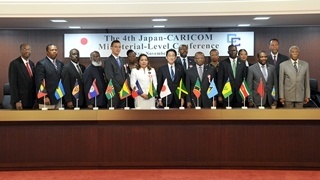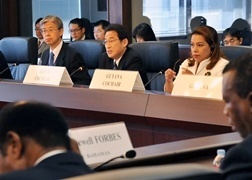Japan-CARICOM Relations
The Fourth Japan-CARICOM Ministerial-Level Conference
November 16, 2014


Foreign ministers and other officials(see reference) from the Caribbean Community (CARICOM) member states, which comprise 14 countries in the Caribbean region, were invited to Tokyo on November 14 and 15 to participate in the Fourth Japan-CARICOM Ministerial-Level Conference. An overview and evaluation of the Conference are as follows.
I. Overview
1. Schedule
- Friday, November 14
- Luncheon hosted by Mr. Takashi Uto, Parliamentary Vice-Minister for Foreign Affairs
- Courtesy call on Mr. Bunmei Ibuki, Speaker of the House of Representatives and executive members of the Japan-CARICOM Parliamentary Friendship League
- Bilateral meetings with Foreign Minister Fumio Kishida (Guyana, Belize, and Grenada)
- Reception hosted by Mr. Yasuhide Nakayama, State Minister for Foreign Affairs
- Saturday, November 15
- Fourth Japan-CARICOM Ministerial-Level Conference
- Luncheon hosted by Minister Kishida
- Bilateral meetings with Minister Kishida (Antigua and Barbuda, Haiti, Jamaica, Saint Christopher and Nevis, and Saint Lucia)
- Bilateral meetings with State Minister Nakayama (CARICOM Secretariat, The Bahamas, Barbados, Commonwealth of Dominica, Saint Vincent and the Grenadines, Suriname, and Trinidad and Tobago)
- Sunday, November 16
- Sightseeing tour in Tokyo
2. Fourth Japan-CARICOM Ministerial-Level Conference
On Saturday, November 15, Foreign Minister Kishida co-chaired the Fourth Japan-CARICOM Ministerial-Level Conference with foreign ministers and other officials from CARICOM member states, which comprise 14 countries in the Caribbean region. An overview of the Conference is as follows.
The participating countries held discussions in line with the three pillars of Japan’s CARICOM policies announced by Prime Minister Shinzo Abe at the first Japan-CARICOM Summit Meeting in July this year. Following the Conference, the Japan-CARICOM Joint Ministerial Statement [PDF] was adopted.
was adopted.
(1) Japan-CARICOM relations
- a) First Pillar: ”Cooperation towards sustainable development, including overcoming the vulnerabilities particular to Small Island Developing States”
- Minister Kishida stated that as a result of considering the importance of assistance not based solely on GDP per capita, a point in which the CARICOM side expressed strong interest at the past Ministerial-Level Conference in September, Prime Minister Abe announced at the Japan-CARICOM Summit Meeting in July this year that Japan would conduct field surveys on future cooperation. Minister Kishida explained that as a result, surveys have been carried out in the areas of renewable energy and energy conservation since the end of August this year, and that a survey in the field of disaster risk reduction is also scheduled to be carried out soon. Minister Kishida also mentioned that Japan will consider concrete cooperation based on the results of these surveys.
- In response, the CARICOM member states expressed their appreciation for the strengthening of the relationship between Japan and CARICOM, and the broad array of assistance being extended by Japan, along with stating that this Ministerial-Level Conference is an expression of both sides’ strong interest in strengthening cooperation. They also expressed gratitude and expectations over Japan’s serious consideration of CARICOM’s long-standing concerns and the concrete progress that is being made in this regard.
- b) Second Pillar: Deepening and expanding bonds founded on exchanges and friendship
- Both sides shared the view that they will explore the possibility of utilizing international conferences as an opportunity to hold Ministerial-Level Conferences frequently.
- Both sides appreciated the progress made through exchanges during the Japan-CARICOM Friendship Year, and confirmed that they will continue mutual visits by government officials, the promotion of exchanges between members of parliament, exchanges via the Japan-CARICOM Young Diplomats Invitation Program and the JET Program, the promotion of support for Japanese language education at the University of the West Indies, and the promotion of tourism between Japan and CARICOM.
(2) Third Pillar: Cooperation in addressing challenges of the international community
- a) United Nations Security Council reform
- Minister Kishida stated that he would like to continue to cooperate closely with CARICOM in order to achieve reforms in the Security Council, in view of the 70th anniversary of the founding of the UN next year. The CARICOM member states also stated that they attach importance to achieving Security Council reforms, and the view was shared that coordination will be strengthened with a view to converging their positions.
- b) Climate change and Small Island Developing States (SIDS)
- Minister Kishida stated that he would like to cooperate with CARICOM to reach an agreement on a new post-2020 international framework that is fair, effective and includes all countries, and also to address the issue of the vulnerabilities particular to SIDS. Minister Kishida also mentioned that Japan announced its support to by training for 5,000 personnel, based on the standpoint that human resources development is important in all fields, and also intends to make an adequate contribution to the Green Climate Fund (GCF). The CARICOM member states provided a detailed explanation of rising sea levels and the serious impact of frequent natural disasters that are accompanying climate change, and noted that they would like to cooperate on addressing this problem, which requires urgent attention. The CARICOM side also expressed gratitude for Japan’s deep understanding and interest in problems that are particular to SIDS, and close cooperation was confirmed.
- c) Post-2015 development agenda
- Minister Kishida stated that the post-2015 development agenda should be based on the principle of human security, an effective framework to addressing challenges including gender equality, health, and disaster risk reduction, and emphasized the importance of taking the vulnerabilities particular to SIDS into consideration. Minister Kishida noted that he intends to cooperate closely to formulate a framework that is feasible to implement. Minister Kishida also noted that he hopes to obtain participation at the Third UN World Conference on Disaster Risk Reduction in Sendai City in March next year. The CARICOM member states emphasized the development problems that are a consequence of small-scale economies, and expressed their wish that Japan participate in the debate given its utmost consideration to CARICOM’s viewpoint.
- Minister Kishida stated that he hopes to obtain CARICOM’s participation at the Third UN World Conference on Disaster Risk Reduction that will be held in Sendai City in March next year. The CARICOM side confirmed proactive participation in the Conference and close cooperation.
- d) Financing for development
- The CARICOM member states explained the development challenges particular to small island developing states, such as frequent natural disasters accompanying climate change, the significant lost of infrastructure development borne by the people due to the small scale of their economies, and their fiscal deficits resulting from their vulnerability to external influences. They explained that the reconstruction cost from natural disasters, CARICOM countries require significant concessional funding but are unable to access them due to the income-level restriction, and since CARICOM still has substantial development needs, they suggested that they would like Japan to understand CARICOM’s position and speak for CARICOM in the international community. Minister Kishida noted that Japan will give utmost consideration to the concerns of CARICOM.
- e) Sustainable use of marine living resources
- Minister Kishida stated that as a responsible fisheries nation Japan would like to strengthen cooperation on the sustainable use of marine living resources, including Cetaceans. The CARICOM member states stated that they share Japan’s standpoint, and would like to cooperate on sustainable fishery industries, sustainable use of marine resources overall, and preserving marine order.
II. Evaluation
- CARICOM member states highly appreciated the three pillars of Japan’s CARICOM policies ((1) Cooperation towards sustainable development, including overcoming the vulnerabilities particular to small island states; (2) Deeping and expanding fraternal bonds of cooperation and friendship; and (3) Cooperation in addressing challenges of the international community), which were announced by Prime Minister Abe at the First Japan-CARICOM Summit Meeting in July, and it was confirmed that relations will be strengthened going forward, based on these pillars.
- Minister Kishida demonstrated that the issues raised at the first Summit Meeting are being followed up steadily. Surveys are currently being carried out in the renewable energy and energy conservation fields, which are essential to overcoming the vulnerabilities particular to small island developing states. This was highly appreciated by the CARICOM side.
- Bearing in mind the debate on the post-2015 development agenda, and in order to raise funds for development, the CARICOM member states asked that Japan, as a donor, speak for CARICOM, so that CARICOM could obtain highly concessional funding grants that take into account the vulnerabilities particular to Small Island Developing States and they expressed high expectations toward Japan.
- Various important challenges facing the international community were discussed, including UN Security Council reform and climate change in the lead up to 2015, an important year for the international community, and Japan was able to promote understanding and support for Japan’s views on various issues. At the same time, Japan demonstrated to CARICOM its determination to take into consideration CARICOM’s views.
- The visit enabled Minister Kishida, State Minister Nakayama and Parliamentary Vice-Minister Uto and the CARICOM side to build relationships , by undertaking frank exchanges of views, and to recognize the importance of frequent policy dialogue, along with carrying out exchanges with those related to the Parliamentary Friendship League, business and cultural circles.
- (Reference) Representatives of CARICOM member states at the Fourth Japan-CARICOM Ministerial-Level Conference
- The Hon. Paul Greene, Minister of Trade, Commerce, Industry, Sports, Culture & National Festivals of Antigua and Barbuda
- H.E. Picewell Forbes, Ambassador to CARICOM of the Commonwealth of The Bahamas
- H.E. Dr. the Hon. Chelston Braithwaite, Ambassador of Barbados to the People’s Republic of China
- The Hon. Wilfred Elrington,Minister of Foreign Affairs of Belize
- Ms. Careen Prevost, Permanent Secretary, Ministry of Foreign Affairs of the Commonwealth of Dominica
- The Hon. Nickolas Steele,Minister for Foreign Affairs & International Business of Grenada.
- The Hon. Carolyn Rodrigues-Birkett,Minister of Foreign Affairs of the Republic of Guyana
- H.E. Mr. Pierre-Duly Brutus, Minister of Foreign Affairs and Worships of the Republic of Haiti
- Sen. the Hon. Arnold Nicholson, Minister of Foreign Affairs and Foreign Trade of Jamaica
- The Hon. Patrice Nisbett, Minister of Foreign Affairs, Justice and Legal Affairs, Homeland Security and Labour of Saint Christopher and Nevis
- The Hon. Alva Baptiste, Minister for External Affairs, International Trade and Civil Aviation of Saint Lucia
- H.E. Ms. Inga Rhonda King, Permanent Representative of St Vincent and the Grenadines to the United Nations
- H.E. Mr. Lloyd Lucien Pinas, Ambassador of the Republic of Suriname to Japan
- Ms. Frances Seignoret, Acting Permanent Secretary of Trinidad and Tobago
- Ambassador Colin Granderson, Assistant Secretary-General, Foreign and Community Relations, CARICOM Secretariat
- (Reference) Three pillars of “Japan’s CARICOM policies”
- First pillar: “Cooperation towards sustainable development, including overcoming the vulnerabilities particular to Small Island Developing States”
- Second pillar: Deepening and expanding bonds founded on exchange and friendship
- Third Pillar: Cooperation in addressing challenges of the international community
- (Reference) Japan-CARICOM Friendship Year 2014
- 2014 was designated as the Japan-CARICOM Friendship Year in order to commemorate 20 full years since the commencement of Japan-CARICOM Consultations, and the 50th anniversary of the establishment of diplomatic relations between Japan and Jamaica, and Japan and Trinidad and Tobago. Throughout the year various events are being held in Japan and CARICOM member states with the goal of promoting Japan-CARICOM relations.


 (Open a New Window)
(Open a New Window)